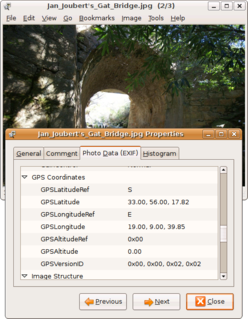Image sharing, or photo sharing, is the publishing or transfer of digital photos online. Image sharing websites offer services such as uploading, hosting, managing and sharing of photos. This function is provided through both websites and applications that facilitate the upload and display of images. The term can also be loosely applied to the use of online photo galleries that are set up and managed by individual users, including photoblogs. Sharing means that other users can view but not necessarily download images, and users can select different copyright options for their images.

Geotagging, or GeoTagging, is the process of adding geographical identification metadata to various media such as a geotagged photograph or video, websites, SMS messages, QR Codes or RSS feeds and is a form of geospatial metadata. This data usually consists of latitude and longitude coordinates, though they can also include altitude, bearing, distance, accuracy data, and place names, and perhaps a time stamp.
BuzzNet is a photo, journal, and video-sharing social media network, currently owned by Hive Media. The network was owned by SpinMedia from its inception until September 2016. Like other social networking services, Buzznet is a platform for members to share content based on their personal interests. Unlike other social networking services that focus primarily on messaging and profile pages, Buzznet members participate in communities that are created around ideas, events and interests, most predominantly music, celebrities, and the media.
My Opera was the virtual community for Opera web browser users. It belonged to Opera Software ASA. In addition to being a support site for the Opera browser, My Opera worked like a social networking site. It offered services such as blogs, photo albums, the free email service My Opera Mail and more. My Opera was closed down on March 3, 2014.

Mobile social networking is social networking where individuals with similar interests converse and connect with one another through their mobile phone and/or tablet. Much like web-based social networking, mobile social networking occurs in virtual communities.

eBuddy is a privately held Dutch software company that offers instant messaging services. As of 2011, eBuddy reported 100 million downloads. The company's flagship service is XMS, a proprietary cross-platform instant messaging service. After some changes of ownership, the company is now again owned by its original founders, Onno Bakker and Jan-Joost Rueb.
The online service imeem was a social media website where users interacted with each other by streaming, uploading and sharing music and music videos. It operated from 2003 until 2009 when it was shut down after being acquired by MySpace.

Jaiku was a social networking, micro-blogging and lifestreaming service comparable to Twitter, founded a month before the latter. Jaiku was founded in February 2006 by Jyri Engeström and Petteri Koponen from Finland and launched in July of that year. It was purchased by Google on October 9, 2007.

Geosocial networking is a type of social networking in which geographic services and capabilities such as geocoding and geotagging are used to enable additional social dynamics. User-submitted location data or geolocation techniques can allow social networks to connect and coordinate users with local people or events that match their interests. Geolocation on web-based social network services can be IP-based or use hotspot trilateration. For mobile social networks, texted location information or mobile phone tracking can enable location-based services to enrich social networking.

Badoo is a dating-focused social network founded by Russian entrepreneur Andrey Andreev in 2006. It is headquartered in Limassol, Cyprus and London, United Kingdom, with offices in Malta, Russia and the United States. It operates in 190 countries and is available in 47 different languages, making it the world's most widely used dating network. The app is available on iOS, Android, and the web. Badoo operates on a freemium model, whereby the core services can be used without payment.

Odnoklassniki is a social network service used mainly in Russia and former Soviet Republics. The site was developed by Albert Popkov and launched on March 4, 2006.
qeep is a social network for mobile phones. A license-free application, qeep was first released in beta in 2006. Initially meant for Java mobile owners only, in 2011 the mobile social network launched an Android version. As of fall 2015 there is also a client for the iPhone available.

Koinup is an image and video hosting service, web portal and online community for virtual world users. It is used both as a photo and video repository platform and as a tool to share virtual world screenshots, photographs and machinima. As of November 2008, it claims to host more than 100,000 items uploaded by its members and reaches about 100,000 visitors monthly.

Social media marketing is the use of social media platforms and websites to promote a product or service. Although the terms e-marketing and digital marketing are still dominant in academia, social media marketing is becoming more popular for both practitioners and researchers. Most social media platforms have built-in data analytics tools, enabling companies to track the progress, success, and engagement of ad campaigns. Companies address a range of stakeholders through social media marketing, including current and potential customers, current and potential employees, journalists, bloggers, and the general public. On a strategic level, social media marketing includes the management of a marketing campaign, governance, setting the scope and the establishment of a firm's desired social media "culture" and "tone."
Wadja solves the problem of conversation relevance by giving users a way to label social activity, and curate that activity into meaningful conversations. Wadja is based in Cyprus and had its BETA launch in August 2006. As of December 2009, Wadja had over 5,000,000 registered users.

Kin was a short-lived mobile phone line from Microsoft designed for users of social networking. The phones, aimed at people between ages 15 and 30, were manufactured by Sharp Corporation and sold through Verizon Wireless.
GyPSii is a provider of geosocial networking applications and services for the iPhone, iPod, iPad, BlackBerry OS, Android and Java-based phones, Symbian S60 and S40, Windows Mobile and MID notebooks. The company is headquartered in Amsterdam, Netherlands, with offices in Asia and the United States.
Microsoft mobile services are a set of proprietary mobile services created specifically for mobile devices, they are typically offered through mobile applications and mobile browser for Windows Phone, | platforms, BREW, and Java. Microsoft's mobile services are typically connected with a Microsoft account and often come preinstalled on Microsoft's own mobile operating systems while they are offered via various means for other platforms. Microsoft started to develop for mobile computing platforms with the launch of Windows CE in 1996 and later added Microsoft's Pocket Office suite to their Handheld PC line of PDAs in April 2000. From December 2014 to June 2015, Microsoft made a number of corporate acquisitions, buying several of the top applications listed in Google Play and the App Store including Acompli, Sunrise Calendar, Datazen, Wunderlist, Echo Notification Lockscreen, and MileIQ.
Comparison of user features of messaging platforms refers to a comparison of all the various user features of various electronic instant messaging platforms. This includes a wide variety of resources; it includes standalone apps, platforms within websites, computer software, and various internal functions available on specific devices, such as iMessage for iPhones.











